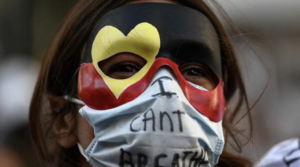Home » Commentary » Opinion » Cancel culture is destroying our society
· The Australian
 As we approach the anniversary of the death of George Floyd, and the wave of outrage it prompted around the world about the treatment and perceptions of black people, so too are we approaching the anniversary of one of the most unfortunate consequences: the expansion, or rather inflammation, of “cancel culture”.
As we approach the anniversary of the death of George Floyd, and the wave of outrage it prompted around the world about the treatment and perceptions of black people, so too are we approaching the anniversary of one of the most unfortunate consequences: the expansion, or rather inflammation, of “cancel culture”.
This is the phenomenon by which anyone in public life, the media or academe who refuses to subscribe to the extreme leftist orthodoxies of a militant and vocal minority are “cancelled”. The “cancellation” entails not just the denial of public platforms to those who refuse to conform, but also attempts using social media to seek to remove such people from civilised society and the public consciousness. It had existed before Floyd’s killing, but that appalling event led in turn to what has become one of the most toxic manifestations of mob rule of modern times.
Thus, an economist’s tweet critical of the Black Lives Matter movement means he loses his contract with a Federal Reserve bank. An article written many years ago gets a company executive fired. Children’s books are put out of print. A progressive newspaper opinion editor loses his job for publishing an article by a conservative legislator. In university history departments, there is a campaign to “decolonise the curriculum”.
The original intentions of the BLM movement were laudable. After all, no person, because of their colour, should be denied the ideas of fair treatment accorded to white people.
However, in many Western countries BLM has become an anarchist, anti-capitalist movement largely run by white people, who manipulate the disadvantage experienced by members of other ethnic communities in order to exert political control over majority opinion.
Sadly, and again out of the best intentions, many white people, embarrassed by what they are told is their “privilege”, have fallen for it. And any attempt to try to explain that there are other ways of solving society’s problems — such as through the exercise of tolerance and the encouragement of open debate — is simply squashed by the threat of accusations of racism, or of other equally shameful thought crimes.
No rational person can dispute the destructive effects of prejudice on individuals and on society. But the activists in charge of the cancel culture look for prejudice and racism often where there is none. All many of their targets are guilty of is expressing an inoffensive, but unquestionably different, point of view.
Thus the cancellers strangle debate, kill the ethos of the liberal society, suppress ideas and seek to standardise opinion. What is so shocking about the cancel culture is the hectoring tone and attitude that is designed to end debate before it has started. Shooting first, and asking questions later, is very much the order of the day.
And, so far, political leaders in what we all thought were liberal democracies refuse to take an adequate stand against this illiberal mindset: which means the extremists are running riot.
In Australia, Coon cheese and Colonial beer have been cancelled — the cheese because it unwittingly shared an epithet with a coarse term of racial abuse, the beer because any link between enjoyment and colonialism was deemed inevitably to be wicked and mocking those who suffered from colonialism. It has simply become impossible to suggest that colonialism had any beneficial effects at all (that, for example, it was central to the creation of a great nation such as Australia).
Now the popular Australian ice cream Golden Gaytime may have to be renamed because it allegedly offends homosexual people. For centuries, the adjective “gay” meant happy — which was not least the reason why homosexuals adopted it as slang to describe their orientation; and the suggestion in the ice cream’s name is that those who consume it are having a good time when they do.
It is by no stretch of the imagination disparaging towards homosexuals, who even today have no copyright on the word. Alas, with rare exceptions, our political class — terrified of being stigmatised as homophobic — is slow to defend owner Unilever’s right to call one of its brands by this harmless name.
In New Zealand, the brand is known as Cookie Crumble. Since in some parts of the English-speaking world “cookie” can be used to describe somebody who might be mentally unstable, it can only be a matter of time before that, too, is removed.
In universities across the US and Britain (perhaps Australia one day?), outrages against freedom of speech — particularly in disciplines such as the teaching of politics, languages and history — are being perpetrated daily.
And those universities are now routinely producing a generation of students who regard free speech as dispensable and liberal values as inherently bad. That, more than anything, is why responsible politicians should act to stop this manipulation of our values and the vilification of those whose only offence is not to agree with the stifling orthodoxy.
Because if they don’t, our liberal society, and all the good it has created, will soon be things of the past, and we may not even be allowed to study or debate the history of them.
Cancel culture is destroying our society